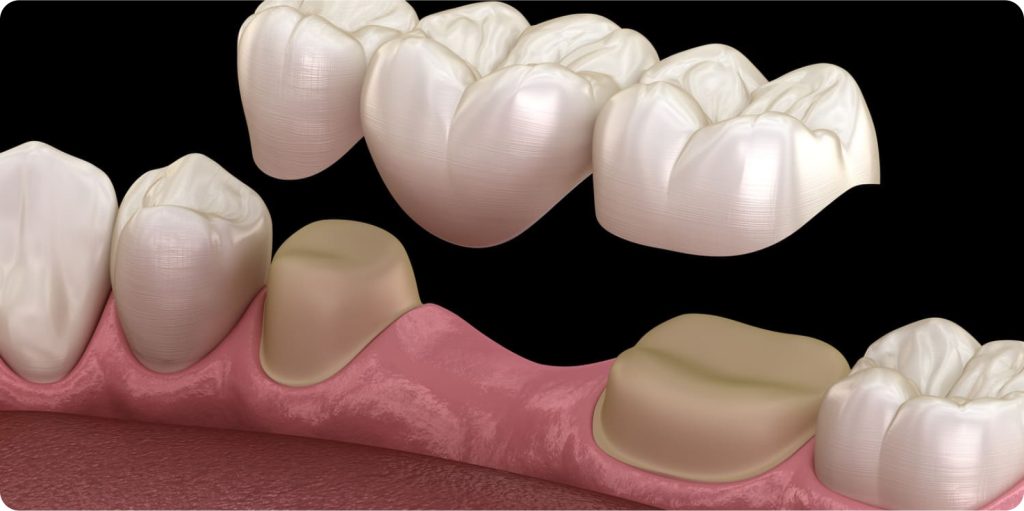Dental Bridges in Montreal
Dental Bridges
A dental bridge is a common option for replacing one or more missing teeth. There are four main types of dental bridges: conventional bridges, cantilever bridges, Maryland bridges, and implant-supported bridges, which are recommended based on the specific needs of each patient. At Doctor Wisdom, we offer these different types of dental bridges and will guide you in choosing the option best suited to your situation.
What is a Dental Bridge?
A bridge also called a “fixed bridge” or a “fixed dental prosthesis,” is a dental restoration that replaces one or more missing teeth. It extends across an area that has no teeth and is typically made up of an artificial tooth fused between 2 crowns which are put on top of your natural tooth.
Types of Dental Bridges
A few dental bridges exist for replacing missing teeth such as :
- Traditional dental bridge: This is the most commonly used type of dental bridge. It consists of a dental crown attached to the two surrounding teeth with an artificial tooth or bridge in between to fill the gap. This type of bridge is known for its strength, as it can withstand significant forces. However, it requires modification of the two adjacent teeth on either side of the missing tooth.
- Cantilever dental bridge: Similar to the traditional bridge, it has only one anchoring tooth. This type of bridge is generally less recommended for back teeth, as they are subjected to significant chewing forces.
- Maryland bonded bridge: It uses a structure similar to a traditional dental bridge but relies on a metal or porcelain framework instead of dental crowns as anchors. This type of bridge is often used to replace missing front teeth, such as lateral incisors. It is less suitable for back teeth as it may be less resistant to chewing forces.
- Implant-supported bridge: This type of bridge is supported by dental implants rather than adjacent teeth. It is used to fill larger gaps with several missing teeth. Implant-supported bridges are known for their durability and ability to restore chewing function while offering a solution that closely resembles the appearance and feel of natural teeth.

The Advantages of Dental Bridges
A dental bridge can offer several benefits, including:
• Replacing one or more missing teeth.
• A fixed option, different from a removable partial denture.
• An alternative for individuals for whom dental implants are not recommended, such as in cases of significant bone loss.
• Restoring the natural appearance of your smile.
• Restoring functions such as chewing and speaking.
• Helping maintain facial structure by reducing the risks associated with missing teeth.
Who is a Good Candidate for a Dental Bridge?
A dental bridge may be an option to replace one or more missing teeth located next to each other, which have been lost or extracted due to issues such as decay, failed treatments, or trauma. In many cases, a bridge can replace two to three consecutive missing teeth.
For a durable bridge, it is important to have two healthy and strong teeth on either side of the gap. Good oral hygiene and the absence of urgent dental work that needs to be completed before placing the bridge are also necessary for considering this option.
The Dental Bridge Cost in Montreal
The cost of a dental bridge may vary depending on several factors, including the number of teeth to be replaced and the type of bridge selected. A personalized evaluation is required to determine the exact cost.
The Dental Bridge Procedure
The placement of a dental bridge typically involves two steps:
1. First Appointment – Tooth Preparation:
The dentist prepares the anchor teeth (supporting teeth) by removing a thin layer of enamel and dentin to make room for the crowns. A temporary bridge is then placed to protect the teeth until the permanent bridge is installed.
2. Second Appointment – Bridge Placement:
During this appointment, the dentist checks the fit of the bridge. Once the bridge is deemed suitable, the temporary bridge is removed, and the permanent bridge is cemented onto the prepared teeth.
Adjusting to a Dental Bridge
Most patients take about two weeks to fully adjust to their new dental bridge. Mild sensitivity may occur during the first few days. During this adjustment period, it is advisable to avoid consuming very hot or cold foods and beverages. Using toothpaste designed for sensitive teeth can also help reduce any discomfort.
Caring for Your Dental Bridge
To ensure the longevity of your dental bridge, maintaining good oral hygiene is essential. Here are some tips:
• Brush your teeth at least twice a day with appropriate toothpaste.
• Use dental floss or a water flosser to clean the areas under the bridge.
• Schedule regular visits to your dentist for professional cleanings and check-ups.
Talk to Your Dentist About Dental Bridges
Before placing a dental bridge, a complete evaluation is necessary to determine your specific needs and choose the option best suited to you. Schedule a consultation with our team to discuss the available solutions. For more information, contact us by phone at 514-778-4444, by email at doctorwisdom@hotmail.com, or through our contact form.
Contact Us
Location
1280 Boul. Marcel-Laurin, Suite
A,
VSL, H4R 1J9
Contact
514-778-4444
doctorwisdom@hotmail.com
Opening Hours
- Monday
- Tuesday
- Wednesday
- Thursday
- Friday
- - 9 am - 8 pm
- - 9 am - 8 pm
- - 9 am - 8 pm
- - 9 am - 8 pm
- - 9 am - 8 pm

Meet the Dentist: Dr. Wisdom
Dr. Ahmad Wisdom Aoude’s journey into dentistry was truly a family affair, shaped by a deep-rooted passion from a young age. He proudly earned his doctorate in dentistry from the renowned University of Montreal, but what truly sets him apart is his insatiable hunger for knowledge and skill enhancement. Dr. Aoude embarked on a remarkable educational journey, which included specialized training in conscious sedation, orthodontics, advanced Invisalign techniques, implantology, radiology, endodontics, and periodontics. His commitment to excellence extends to his active participation in both local and international dental conferences, including the prestigious GP Summit of Invisalign.
As a testament to his dedication, Dr. Aoude holds memberships in esteemed dental organizations such as the Association of Dental Surgeons of Quebec (ACDQ), the College of Dentists of Quebec (ODQ), and the Canadian Dental Association (ADC). What truly distinguishes him is his multidisciplinary approach to dentistry, where he seamlessly navigates general dentistry, Invisalign, orthodontics, implantology, porcelain veneers, dental esthetics, surgery, wisdom tooth extraction, endodontics (root canal treatments), and periodontics, and sleep apnea therapy. Notably, he brings a decade of experience in Invisalign, orthodontics, implantology, surgery, prosthodontics, root canal treatments, and fillings, making him a trusted professional dedicated to delivering comprehensive dental care. Dr. Aoude’s accomplishments and commitment to his craft shine brightly in Montreal’s dental landscape.
Dental Bridge FAQs
Which dental bridge is best?
The type of bridge that is best for you will depend on various factors such as which tooth is missing, if there is more than one tooth missing, if it’s an anterior or posterior tooth, how is the health of the adjacent teeth, etc. A full evaluation will need to be done prior to knowing which kind of bridge will be most beneficial for you.
Are dental bridges painful?
A dental bridge is not painful, but you may feel some sensitivity or discomfort for the first few days and up to a few weeks.
What is the alternative to a dental bridge?
The main alternative to a dental bridge is a removable partial denture.
Can a dental bridge be done in one day?
A dental bridge requires two appointments but you will be left with a temporary bridge in between sessions to avoid any sensitivity and to restore a little bit of function and aesthetic in the meantime.




